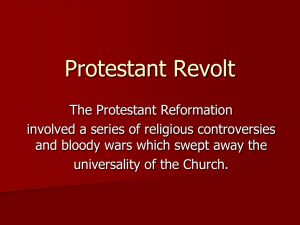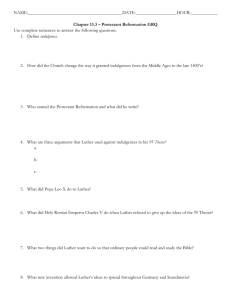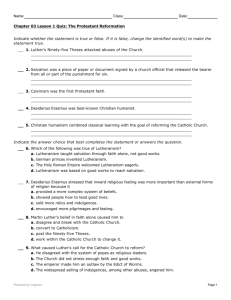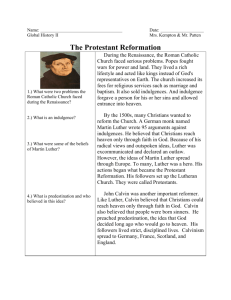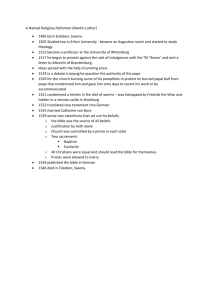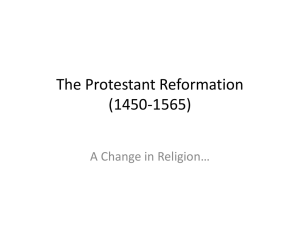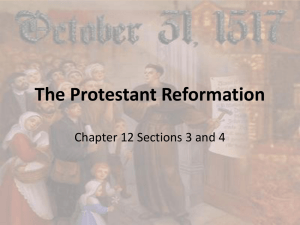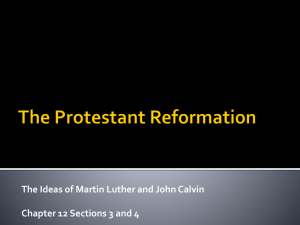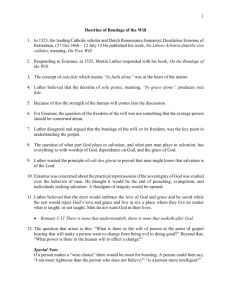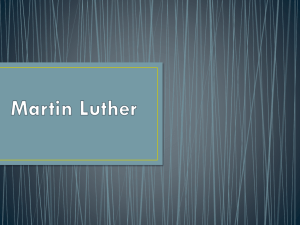apeh exam review multiple choice questions part 2 - roadrunner-APEH
advertisement
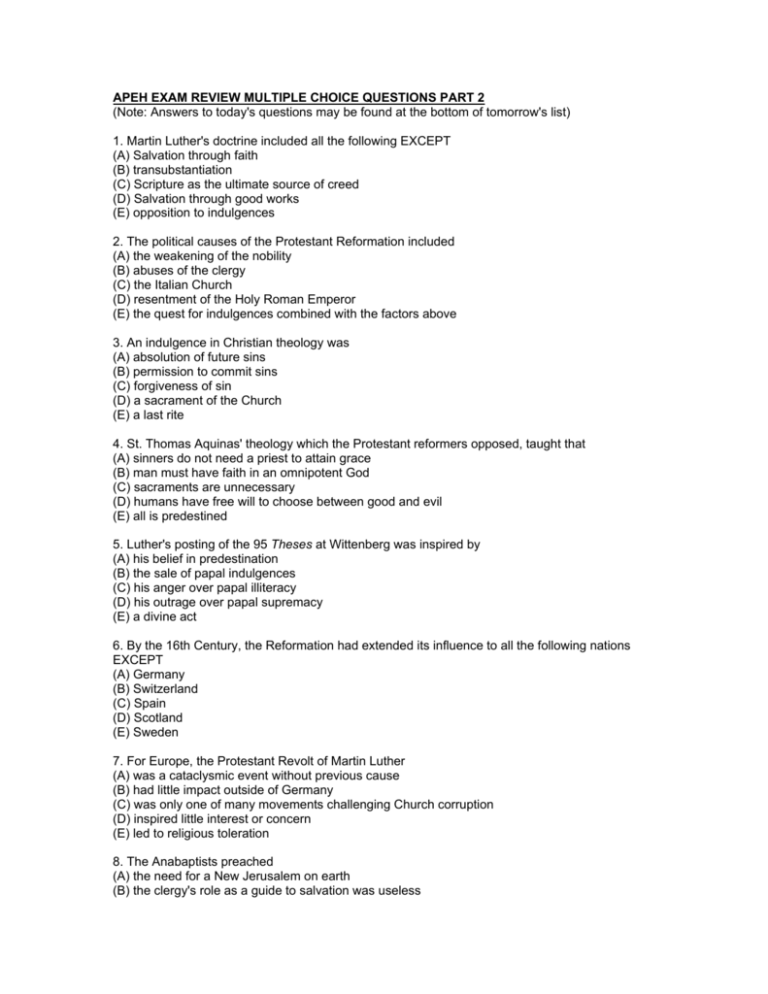
APEH EXAM REVIEW MULTIPLE CHOICE QUESTIONS PART 2 (Note: Answers to today's questions may be found at the bottom of tomorrow's list) 1. Martin Luther's doctrine included all the following EXCEPT (A) Salvation through faith (B) transubstantiation (C) Scripture as the ultimate source of creed (D) Salvation through good works (E) opposition to indulgences 2. The political causes of the Protestant Reformation included (A) the weakening of the nobility (B) abuses of the clergy (C) the Italian Church (D) resentment of the Holy Roman Emperor (E) the quest for indulgences combined with the factors above 3. An indulgence in Christian theology was (A) absolution of future sins (B) permission to commit sins (C) forgiveness of sin (D) a sacrament of the Church (E) a last rite 4. St. Thomas Aquinas' theology which the Protestant reformers opposed, taught that (A) sinners do not need a priest to attain grace (B) man must have faith in an omnipotent God (C) sacraments are unnecessary (D) humans have free will to choose between good and evil (E) all is predestined 5. Luther's posting of the 95 Theses at Wittenberg was inspired by (A) his belief in predestination (B) the sale of papal indulgences (C) his anger over papal illiteracy (D) his outrage over papal supremacy (E) a divine act 6. By the 16th Century, the Reformation had extended its influence to all the following nations EXCEPT (A) Germany (B) Switzerland (C) Spain (D) Scotland (E) Sweden 7. For Europe, the Protestant Revolt of Martin Luther (A) was a cataclysmic event without previous cause (B) had little impact outside of Germany (C) was only one of many movements challenging Church corruption (D) inspired little interest or concern (E) led to religious toleration 8. The Anabaptists preached (A) the need for a New Jerusalem on earth (B) the clergy's role as a guide to salvation was useless (C) the use of Baptism is ineffectual (D) that material goods were sinful (E) that salvation is predestined 9. The most accurate of the following statements concerning the Anglican Church is (A) It closely resembled Calvinism. (B) It gained the support of entire population. (C) It began as a Catholic movement under the king. (D) It was caused by the people's resentment of the Pope. (E) It developed as a popular movement in England. 10. The Book of Common Prayer became the (A) sanctioned prayer book of the Anglican Church (B) accepted gospel of John Calvin (C) scripture according to the Presbyterian Church (D) heresy of the Waldensians (E) universal prayer book in Europe 11. Martin Luther finally concluded (A) one's love of God had to be demonstrated by prayer (B) the sacraments of Baptism and Eucharist were essential to God's grace (C) ascetic practices were necessary to attain salvation (D) by faith alone are humans justified in the sight of God (E) the Pope was infallible 12. All of the following were predecessors of the Lutheran reform EXCEPT (A) John Wycliffe (B) John Huss (C) Marsiglio of Padua (D) Thomas Aquinas (E) John Gerson 13. Ulrich Zwingli was responsible for the Protestant conversion of (A) the Netherlands (B) Switzerland (C) France (D) Sweden (E) Scotland 14. John Calvin's concept of predestination is best verified by (A) a sign of God's grace at birth (B) evidence of material success and piety (C) trial by ordeal (D) a miraculous occurrence within the congregation (E) the Holy Office of the Inquisition 15. The German Peasants' Revolt of 1524-1525 was (A) a desperate attempt to lower prices and break the monopoly of the wealthy (B) the first documented revolt of the lower classes in Europe (C) a violent struggle between German peasants and German workers (D) an attempt by the lower classes to seize political rights (E) an uprising of serf against noble YESTERDAY'S ANSWERS 1-C, 2-D, 3-B, 4-A, 5-C, 6-B, 7-D, 8-E, 9-A, 10-C, 11-B, 12-C.
